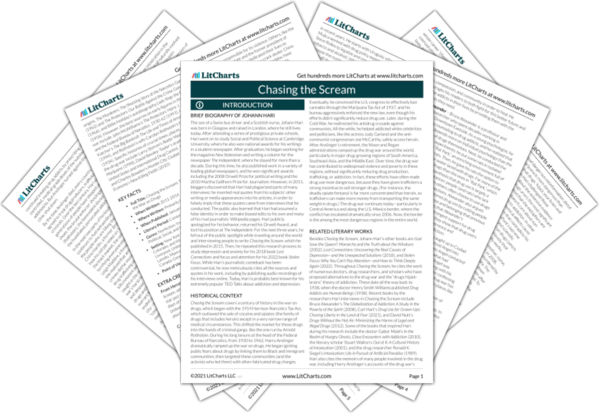Leigh Maddox Quotes in Chasing the Scream
More than 50 percent of Americans have breached the drug laws. Where a law is that widely broken, you can’t possibly enforce it against every lawbreaker. The legal system would collapse under the weight of it. So you go after the people who are least able to resist, to argue back, to appeal—the poorest and most disliked groups. In the United States, they are black and Hispanic people, with a smattering of poor whites. You have pressure on you from above to get results. There has to be a certain number of busts, day after day, week after week. So you go after the weak. It’s not like you are framing them—they are, in fact, breaking the law. You keep targeting the weak. And you try not to see the wider picture.
But then, for some people, it becomes inescapable.
But on I-95, Leigh began to see the act of pulling over a car to search it in a new way. Once, she saw this scene as a soldier in a just war approaching the enemy. Now she sees it as a meeting of people who are surrounded by ghosts. As he approaches the car, the police officer has ranged behind him the ghosts of all the cops he has known, “all the funerals he’s been to, all the people who’ve been killed in traffic stops—because it’s a lot,” she says. And then “there’s also this poor black kid” in the car. Sitting in the passenger seats behind him are his ghosts—all of his relatives and friends who have been killed in police raids or vanished into the American prison system.
Neither can see the other side’s ghosts. They can only hate.

Leigh Maddox Quotes in Chasing the Scream
More than 50 percent of Americans have breached the drug laws. Where a law is that widely broken, you can’t possibly enforce it against every lawbreaker. The legal system would collapse under the weight of it. So you go after the people who are least able to resist, to argue back, to appeal—the poorest and most disliked groups. In the United States, they are black and Hispanic people, with a smattering of poor whites. You have pressure on you from above to get results. There has to be a certain number of busts, day after day, week after week. So you go after the weak. It’s not like you are framing them—they are, in fact, breaking the law. You keep targeting the weak. And you try not to see the wider picture.
But then, for some people, it becomes inescapable.
But on I-95, Leigh began to see the act of pulling over a car to search it in a new way. Once, she saw this scene as a soldier in a just war approaching the enemy. Now she sees it as a meeting of people who are surrounded by ghosts. As he approaches the car, the police officer has ranged behind him the ghosts of all the cops he has known, “all the funerals he’s been to, all the people who’ve been killed in traffic stops—because it’s a lot,” she says. And then “there’s also this poor black kid” in the car. Sitting in the passenger seats behind him are his ghosts—all of his relatives and friends who have been killed in police raids or vanished into the American prison system.
Neither can see the other side’s ghosts. They can only hate.











